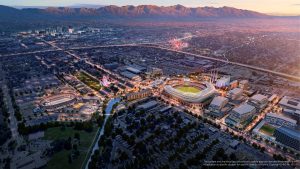SALT LAKE CITY — Gail Miller and a coalition of prominent business leaders, politicians and other famous residents made waves in the sports world this week when they announced they are pursuing a Major League Baseball expansion team, placing them at a “shovel-ready” site at Salt Lake City’s new Power District.
Miller and other members of the Big League Utah coalition confirmed they met with MLB Commissioner Rob Manfred about it last year and they left optimistic about their odds.
“Based on those conversations, we have reason to believe we are a very viable candidate city and candidate market,” said Larry H. Miller Company CEO Steve Starks.
Manfred has made it clear that he would like the league to expand to 32 teams sometime in the not-so-distant future.
The league last expanded in 1998, and it’s still unclear when it might expand again, but Salt Lake City certainly isn’t alone in the pursuit of a major league team. Similar coalitions have emerged in Nashville, Tennessee, and Portland, Oregon, in recent years, while some other cities appear to be possible relocation sites for existing teams.
Here’s a look at how Salt Lake City compares to the field so far.
The possible candidates
For this review, KSL.com looked at Census Bureau and Nielsen Company data to compare the populations and media market sizes — a statistic similar to a metro area — of the cities that are either bidding for an expansion team or are considered favorites for relocation from multiple media reports.
For instance, Las Vegas has long been considered as the most likely landing spot for the Oakland Athletics, while there are a few options for the Tampa Bay Rays, including north of the border. That’s because the franchise recently proposed to play half of its home games in Montreal, Canada, but the idea was rejected.
MLB will also launch its first-ever Mexico City Series later this month, and some have suggested the league could consider that option because it is the largest city in North America. KSL.com reviewed similar data from Canada and Mexico to compare those markets.
Charlotte, North Carolina
- City population (2021 estimate): 879,709
- Media market size: 1.32 million (21st)
Las Vegas
- City population: 646,790
- Media market size: 790,580 (40th)
Mexico City
- City population: 9.21 million
- Media market size: 19.8 million (1st in Mexico)
Montreal
- City population: 1.78 million
- Media market size: 4.2 million (2nd in Canada)
Nashville, Tennessee
- City population (2021 estimate): 678,851
- Media market size: 1.17 million (27th)
Portland, Oregon
- City population (2021 estimate): 641,162
- Media market size: 1.3 million (22nd)
Salt Lake City
- City population (2021 estimate): 200,478
- Media market size: 1.15 million (29th)
Mexico City would obviously tower over any market Major League Baseball currently has, although it would be somewhat experimental because it doesn’t have any major U.S. sports franchises at the moment.
At face value, Salt Lake City lags behind the other candidates in population. That said, Utah Gov. Spencer Cox points out that Salt Lake City’s population doesn’t account for the rest of the county and some of the neighboring cities quite like others on the list do.
If the entire Wasatch Front is considered, there are more than 2.52 million people living in Salt Lake, Davis, Utah and Weber counties combined. That figure doesn’t even account for the “ring counties” surrounding the Wasatch Front, which also have easy access to Salt Lake City.
“That puts us above several current Major League Baseball franchises right now,” Cox said.
Las Vegas, though comparable with Nashville and Portland in population, is also last in the media market among the options. Yet it also brings in a large number of tourists. The city brought in 38.8 million tourists last year, according to KTNV. That’s over an additional 100,000 people in the city per day, on average.
It’s also interesting that Charlotte, Nashville, Portland and Salt Lake City all have larger TV markets than San Diego, Kansas City, Cincinnati or Milwaukee, which already have Major League Baseball teams. Salt Lake City’s market isn’t far off from Pittsburgh, Baltimore and St. Louis among existing MLB cities, too.
Of course, the media market size doesn’t mean everything. The Tampa-St. Petersburg-Sarasota TV market is 13th in size at 2.07 million but it could lose a team if the Rays move, making it the only Top 15 market without an MLB team should it happen.
Other factors to consider
Meanwhile, Cox adds that Utah’s growth over the past few decades has come with economic success, as he continues to pitch the Beehive State to Major League Baseball. He made those remarks during an event to highlight the state having the top economic outlook on the “Rich States, Poor States: ALEC-Laffer State Economic Competitiveness Index” report for the 16th straight year,
The report places North Carolina at No. 2 behind Utah in the economic outlook, while Nevada placed 10th, Tennessee placed 11th and Oregon placed 43rd among the states reportedly vying for an MLB franchise.
“When you look at the economic piece of this, which you overlay on top (our growth), we have had the single-best economy over the past decade by just about any measure,” he said. “When you’re looking at potential cities out there, that places us in kind of the upper echelon and that’s what we’ve heard from (Manfred) and we’ve heard from others, so we feel confident about the potential for a major league franchise to move here.”
This could be a big component of the equation. Baseball reporter Maury Brown, writing for Forbes, points out that having a former NBA team owner like Miller leading the way with a joint coalition that includes several prominent financial figures helps make an underdog like Salt Lake City a “serious player,” especially because it could raise the money needed for expansion fees and a stadium.
And with a potentially crowded field, David Berri, a professor of economics at Southern Utah University, told KSL.com that cities may have to offer some form of subsidy or tax package to catapult over others in the running.
All of these appear to be the types of things that Major League Baseball will consider as it ponders further expansion in the future.
Decision timeline
However, it’s unclear when any expansion will happen. ESPN reported Wednesday that the league wants to figure out the future of the Athletics and Rays before adding any new teams.
So it could be a while before any of these cities know if they are on deck to bat. Two of them may end up with either the A’s or Rays, while it’s possible other cities will join the list seeking an expansion team, too.


